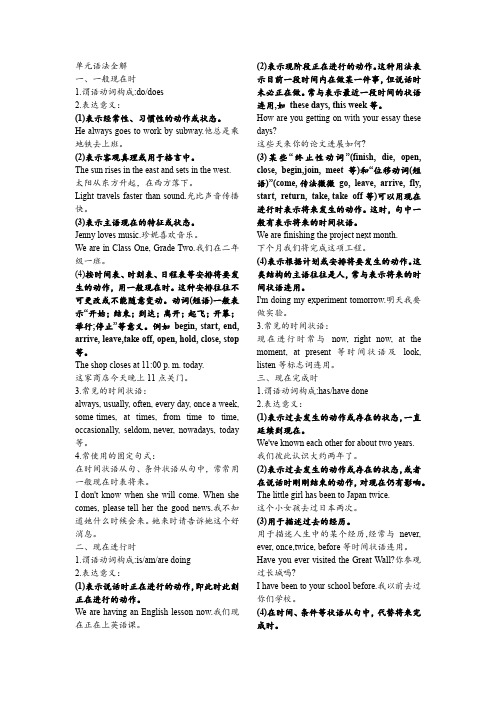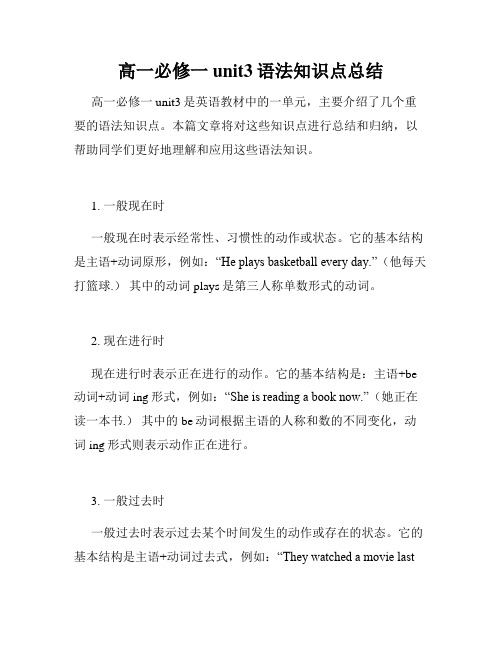最新人教版高一英语必修一Unit-3-语法知识分享
新人教版高中英语必修一Unit 3知识清单

新人教版高中英语必修一Unit 3知识清单重点单词1. honour n.荣誉;尊敬;荣幸(1) in honour of 为了表示对……的敬意;为了纪念……(2) have the honour to do/of doing... 有幸做……=be/feel honoured to do/of doing... 为做……而感到荣幸(3) It’s an honour to do... 很荣幸做……honour v.尊敬(某人);给予表扬(或奖励、头衔、称号)(1) honour sb with sth for... 因……授予某人某物(2) be honoured as... 被尊为……,被誉为……honourable adj.光荣的;高尚的2. determine vt. 决定;判决(1) determine to do... 决定做……(表示动作)(2) be determined to do... 决心做……(表示状态)(3) determine on/upon 决定determination n.决心;决定with determination 坚决地;果断地determined adj.坚决的;坚定的;果断的3. injure vt.(使)受伤;损害injured adj.受伤的;有伤的the injured 伤员injury n.伤害;损伤do sb an injury/do an injury to sb 伤害某人4. strength n.力量;体力(1) build up one's strength/body 强身健体(2) strengths and weaknesses 优点和缺点(3) The strength of...is that... ……的优点是……strong adj.强壮的strengthen vt. 加强;巩固5. fail v. 失败;不及格(1) fail to do... 未能做……(2) fail in doing sth ... 在(做)……上失败failure n.失败;失败的人(或事物)end in failure 以失败告终[易错点拨](1) failure表示抽象意义的“失败”时,不可数;表示具体意义“失败的人或事”时,则可数。
【人教版】高中英语必修一Unit3单元知识点

【⼈教版】⾼中英语必修⼀Unit3单元知识点必修⼀Unit3 Travel journal1.transport vt. 运输;运送n. 运输;运送;交通⼯具public transport 公共交通means of transport 交通⼯具transport sb./ sth. from…to…把某⼈/某物从……运送到……The goods were transported from the factory to the airport by air.His bike is his only means of transport.The goods were damaged during transport.2.prefer vt. 更喜欢,选择某事(⽽不选择其他事物),宁愿(preferred--- preferring)1)prefer sth/to do sth/ doing sth 喜欢做某事2) prefer sb to do sth 宁愿某⼈做3)prefer doing sth to doing sth 与……相⽐,更喜欢……4)prefer to do…rather than do… 宁愿做……不愿做……5)prefer that …(should) do… 更喜欢Preference n. 意为偏爱,喜好;优先权She has a preference for blue.Liu Hulan prefers to die rather than give in.I prefer walking to riding a bike/cycling.Their father prefers them to be home early.I prefer bananas to apples.3.disadvantage 为可数名词,意为不利条件,不便之处be a disadvantage to somebody 是某⼈的弱点be at a disadvantage 处于不利地位put somebody at a disadvantage/ be to one’s disadvantage置某⼈于不利境地/使某⼈处于劣势The fact that she cannot speak English put her at a disadvantage.To have only one leg is a disadvantage to him.I was at a disadvantage because I didn’t speak F rench.advantage 意为好处,优点,利益take advantage of利⽤/占……的便宜to one’s advantage 对某⼈有利advantages and disadvantages 利害得失The agreement is to our advantage.A better education gave us the advantage over those who didn’t receive education.You’d better advise him to take advantage of the opportunity.4.fare指乘坐公共汽车、轮船、出租车等的费⽤;(飞机等的)票价a bus/taxi fare 公共汽车/出租车费a single/return/round-trip fare 单程票/返程票/来回票价How much is the air fare to Beijing?Children under 4 go/travel half-fare/travel at full fare/reduced fare/half fare.fee指给律师、医⽣等专业⼈员的酬⾦或(参加考试的)报名费,(加⼊俱乐部的或⼊场的)会费或学费等,常⽤复数形式。
高一必修一unit3语法

单元语法全解一、一般现在时1.谓语动词构成:do/does2.表达意义:(1)表示经常性、习惯性的动作或状态。
He always goes to work by subway.他总是乘地铁去上班。
(2)表示客观真理或用于格言中。
The sun rises in the east and sets in the west.太阳从东方升起,在西方落下。
Light travels faster than sound.光比声音传播快。
(3)表示主语现在的特征或状态。
Jenny loves music.珍妮喜欢音乐。
We are in Class One, Grade Two.我们在二年级一班。
(4)按时间表、时刻表、日程表等安排将要发生的动作,用一般现在时。
这种安排往往不可更改或不能随意变动。
动词(短语)一般表示“开始;结束;到达;离开;起飞;开幕;举行;停止”等意义。
例如begin, start, end, arrive, leave,take off, open, hold, close, stop 等。
The shop closes at 11:00 p. m. today.这家商店今天晚上11点关门。
3.常见的时间状语:always, usually, often, every day, once a week, some-times, at times, from time to time, occasionally, seldom,never, nowadays, today 等。
4.常使用的固定句式:在时间状语从句、条件状语从句中,常常用一般现在时表将来。
I don't know when she will come. When she comes, please tell her the good news.我不知道她什么时候会来。
她来时请告诉她这个好消息。
二、现在进行时1.谓语动词构成:is/am/are doing2.表达意义:(1)表示说话时正在进行的动作,即此时此刻正在进行的动作。
新人教版高一英语必修一UNIT3知识点讲解

diet n. 饮食,节食
be/go on a diet在节食 The doctor says I’ve got to go on a diet. 医生说我必须节食。 我打算下周节食。 I am going to be on a diet next week. dietary n. 规定饮食(法) dietetic adj. 饮食的 a balanced diet 一份平衡饮食 put sb. on a diet 使某人节食 diet drinks 低热量饮料
年轻人应该尊重年长者。 解析:show/pay/give honor to
medal n.奖章
He received a medal in reward for his bravery. 他因表现勇敢而获得了一枚奖章。 You deserve a medal for putting up with Phil for so long! 你能忍耐菲尔这么久,真应该赏你一枚勋章!
strength n.力量;体力
Are men equal to women in physical strength? 在体力上男人和女人相同吗? You need to build up your strength. 你需要养精蓄锐。
failure n.失败 I reflected on possible reasons for my failure. 我仔细考虑导致我失败的种种原因。 He is disappointed to face his failure in the exam. 他很失望地面对考试的失败。 Failure is the mother of success. 失败乃成功之母。
apart adv.分离;相距
She keeps herself apart from other people. 她与其他人保持距离。 Their birthdays are only three days apart. 他们的生日仅隔三日。 The two houses stood 500 metres apart. 两座房子相距 500 米。 We’re living apart now. 我们现在不住在一起。
高一必修一unit3语法知识点总结

高一必修一unit3语法知识点总结高一必修一unit3是英语教材中的一单元,主要介绍了几个重要的语法知识点。
本篇文章将对这些知识点进行总结和归纳,以帮助同学们更好地理解和应用这些语法知识。
1. 一般现在时一般现在时表示经常性、习惯性的动作或状态。
它的基本结构是主语+动词原形,例如:“He plays basketball every day.”(他每天打篮球.)其中的动词plays是第三人称单数形式的动词。
2. 现在进行时现在进行时表示正在进行的动作。
它的基本结构是:主语+be 动词+动词ing形式,例如:“She is reading a book now.”(她正在读一本书.)其中的be动词根据主语的人称和数的不同变化,动词ing形式则表示动作正在进行。
3. 一般过去时一般过去时表示过去某个时间发生的动作或存在的状态。
它的基本结构是主语+动词过去式,例如:“They watched a movie lastnight.”(他们昨晚看了一场电影.)过去式的构成形式有规则变化和不规则变化,需要根据具体的动词来确定。
4. 过去进行时过去进行时表示过去某个时间正在进行的动作。
它的基本结构是:was/were+动词ing形式,例如:“I was studying when he called me.”(他给我打电话的时候,我正在学习.)过去进行时的be动词形式根据主语的人称和数的不同变化,动词ing形式则表示过去进行的动作。
5. 一般将来时一般将来时表示将要发生的动作或存在的状态。
它的基本结构是:will/shall+动词原形,例如:“I will go to Beijing next week.”(我下周将去北京.)不同的人称和数有不同的构成形式。
6. 现在完成时现在完成时表示过去某个时间开始的动作一直延续到现在,或者过去发生的动作对现在产生的影响。
它的基本结构是:have/has+动词过去分词,例如:“I have lived here for ten years.”(我住在这里已经十年了.) have/has的形式根据主语的人称和数的不同变化,动词过去分词则表示动作已经完成。
人教版高一英语必修一unit1-3的短语和语法

Unit One Friendship一、重点短语1. be good to 对……友好be good for 对……有益;be bad to…/be bad for…2.add up sth 加起来add up to 总计add to 增加;加强(多用于抽象意义)a dd…to…在…中加上….3. get sth done使某物/事被做…4. on purpose 有目的的5. go /be on holiday 休假6. be upset不安upset sb.使某人心烦意乱be/get upset about 为…心烦;为…不安7. face to face 面对面hand in hand 手拉手shoulder by shoulder 肩并肩8. fall in love (with sb.) (同某人)坠入爱河,(与某人)相爱9. join in 参加(某些活动:讨论、游戏、工作、比赛…);take part in 参加(群众性活动、会议等,参加者持积极态度,起一份作用)join 加入(组织,社会团体;参军;并成为其中一员)10. have trouble with sth. have trouble/difficulty in doing11. suffer from 患…病; 受…苦痛;遭受go through遭遇;经历;获准,通过12. be/get tired of…对…感到厌倦13. be concerned about 关心14. get on/along well with 与…相处融洽15. be good at=do well in 擅长于…16. find it + adj. to do sth. 发现做某事是…17. no longer / not …any longer 不再…18. too much +n,(不可数)太多……much too +adj. 太…19. no longer=not …any longer 如今不再……20. it’s no pleasure/use doing sth 做…并不开心/没有用21. make sb. sth. 使某人成为…make sb. do sth. 使某人做某事22. sth happen to sb 某人发生某事sb happen to do sth 某人碰巧做某事It so happened that…. 正巧23.for example, 例如,(具体举一个例子)namely 即,(把例举的事物举完)such as+n./doing诸如…之类(例举事物中的多个例子)二、语法点1.直接引语和间接引语,注意人称、时态、时间状语的变化!2. 强调句型:It is/was+ 强调部分(除谓语外)+that/who+其他部分3. 第…次做…. : It is/ was the fisrt( second…序数词) time+that….have/had done….4. 动名词做定语,与修饰的名词无逻辑上的主谓关系,只表示所修饰名词的一般用途,必须位于名词之前:swimming pool、reading room、hiding place现在分词做定语:与修饰的名词有,逻辑上的主谓关系,表示所修饰名词特征,表修饰的名词正在进行的动作:flying bird、running boy、singing girl….5.with +复合结构,中间可包含副词、现在分词、过去分词、介词短语等,在句子起状语作用。
高一英语人教版必修一unit3 语法

A my mum with I've won a holiday for two to Florida. I___ me to have fun there. A. am taking B. have taken
C. take
D. will have taken
Exercise:
me up.
我正要去上班的时候,这时有人打电话给我。
Exercise:
--I have not finished my dinner yet.
D for us. --But our friends___ A. will wait C. have waited
B. wait D. are waiting
C. leaves; is leaving
D. is leaving; is leaving
Ladies and gentlemen, please fasten your seat belts. The plane__. B A. takes off B. is taking off C. has taken off D. took off Hurry up! The train___. B You know it___ at 8:30 am. A. leaves; leaves B. is leaving; leaves
表将来的其它表达方式:
1.be going to do: ①表示人主观上近期的“打算、意图、计划”等 E.g Are you going to visit the museum this afternoon? ②表示有某种迹象表明最近将会发生的事。 Look! It's going to rain.
人教版英语高一必修一Unit 3--知识点全

persuade /pə'sweId/ v t . & v i . 说服; 劝说; 使相信; 使信服
persuade sb. to do sth.
说服某人做某事
We have no idea how to persuade him to give up the idea.
我们不知道如何说服他放弃这个念头。
使某人相信某事
try to persuade sb.to do sth. =advise sb.to do sth.
尽力劝说某人做某事(但未劝服)
即学即用
(1)我禁不住劝说,参加了比赛。
I allowed myself to be persuaded into enteri_n_g the competition.
graduate v. 毕业 n. 大学毕业生;学士学位获得者
graduate from + 学校 毕业于......学校
C.to stay; to going
D.staying; to going
2. The little girl go to the cinema rather than C at home alone
that night.
A.preferred; stay
B.prefers to; to stay
He is so selfish.
A.cares for B.cares about C.cares to D.cares of
ห้องสมุดไป่ตู้
[教材P 原句] 17
Which kind of transport do you_p_r_e_f_e_r___to
use: bus or train?
人教版高中英语必修一Unit3语法

3.Be to do 表示预定、按计划或安排将要发生的动 作。 They are to get married next month. 他们下个月就要结婚了。
4.Be about to do 意为‘刚要,正要’,表示非常近 的将来。 Be about to do 不能和表示将来时间的副词连用。 She was about to leave when some guests came . 她要离开,这时来了一些客人。
温馨提示: 其中有一些动词一般不用于进行时。 1.表示人的心理状态、情感的动词 want ,mind,wish,recognize,know,understand,hate ,fear等 2.表存在或位置的词:remain , stand 等 3.表示知觉的动词:see,hear,notice,smell等 4.表示所属的词:have ,possess,own,consist of 等 5.暂时性的动词:accept,allow,decide,promise等
二、表示将来 1.动词come ,go , arrive ,leave,start ,begin,return等的现在进行 时可以表示将来的动作,常有意图,安排或 打算的含义。它常表示最近或较近的将来会 发生的动作。 eg. When are you starting ? 你们什么时候动身? 2.还有一些动词也可用现在进行时表示将来 eg.I’m meeting you after class. 下课后我要见你。
练习: 每句中有一处错误,找出并改正。 1.The train is arrived in 10 minutes . 2.He is leaving to there . 3.He would come back next month . 4.The meeting is take place next week . 5.She was about to begin while the door opened .
人教版高一英语必修一unit3-知识点整理

Unit3 知识点(班二)词汇要点1.determine vt.决定,决心,确定,测定Determination n. 决心,毅力 determined adj. 坚毅的,下决心的 decide[同义] v.决定典型用法 be determined to do sth⑴ She is a girl of great ______________ (determine).⑵ He is determined ________ (face) out the situation.⑶ There is a ____________ (determine) look on his face.2.similar adj. 类似的,相似的be similar to[搭配]类似于,与……相似the same ...as...[近义]与……相同anize v.组织organization n.组织,机构organizer n.组织者organized adj. 有组织的4.surprise vt.使惊奇,使诧异n. 惊奇,诧异Surprised adj. 感到惊讶的 surprising adj. 令人惊讶的be surprised at 对…感到惊讶to one,s surprise (=surprisingly) 令人感到惊奇地是(1) Everybody here was ____ (surprise) the news.(2) ________________________ (surprise),he was so frank that he told me all of his secrets.5..transport n.& v.运送;运输派生:transportation n.运输;交通工具6.persuade vt.说服,劝说persuade sb. to do 说服/劝服某人去做persuade sb. into doing 说服/劝服某人去做persuade sb. out of doing说服/劝服某人不做注意:劝而不服则要用advise sb.to do sth.或者try to persuade sb.to do sth.。
高中英语必修一Unit3语法要点(定语从句)

学习目标:学习并掌握定语从句关系词的使用方法,能够在习题中熟练运用that ,which ,who ,whom ,whose ,when, where, why, as 等常见常考的关系代词和关系副词。
学习重难点:关系代词和关系副词的正确运用。
as 引导定语从句的情况。
1.定语从句的概念 Green team (绿队)→Team in green (绿队)→The team who wear in green.(穿绿衣服的队伍)↓ ↓ ↓形容词 介词短语 从句(即为定语从句)▶▶▶▶▶The Attributive Clause2.关系代词的用法:which, who, whom, whose, that2.1 ①These are the trees were planted last year 。
②These are the students won the first place last year.③The runner ④The games the young men competed in were difficult.▶▶▶▶▶ 归纳总结:在定语从句中当先行词是事物时,那么该从句要用关系代词: 引导。
当定语从句中的先行词是人时,该从句要用关系代词: 引导,同时由此可知,whom ,whose 引导定语从句时先行词也是 。
2.2 指出下列关系关系词在句子中所作的成分 ①( ) ②( )③( ) ④( )⑤The boy we saw yesterday was John’s brother. ( )⑥The book ( )☀难点,常考点:以下情况,引导词用that,不用which。
→ Finally, the thief handed everything that he had stolen.→ This is the best book (that)I’ve ever read.→ He is the only person that I want to see now.→ We talked about the things and persons that we saw then.→Which is the machine that we used last Sunday.Who is the girl that is standing under the tree?→I’ve read all the books that you lend me.→There is a book on the desk that belongs to Tom.3.关系副词的用法:where, when,why3.1 指出下列句子中的先行词以及关系副词在下列句子中的成分①he refused our offer? (先行词:)(成分:)②(先行词:)(成分:)③I first went to Beijing.(先行词:)(成分:)▶▶▶▶▶归纳总结:when, where, why关系副词在定语从句中只做,并且它们的先行词主要表示的意思。
人教版高一英语必修一unit3知识点

人教版高一英语必修一unit3知识点Unit 3 Knowledge Points: The Water CrisisIntroduction:Water, the source of life, is essential for all living organisms. However, with the growing population and the increase in industrialization, the world is facing a severe water crisis. In this article, we will explore the key knowledge points regarding the water crisis discussed in Unit 3 of the People's Education Edition for Grade 11 English.1. Causes of the Water Crisis:The water crisis is primarily caused by a combination of factors, including population growth, pollution, climate change, and mismanagement of water resources. The increasing demand for water, both for domestic uses and industrial purposes, has put a tremendous strain on available water sources.2. Effects of the Water Crisis:The water crisis has far-reaching consequences on both humans and the environment. Firstly, the scarcity of clean water leads to hygiene and sanitation issues, resulting in the spread of waterborne diseases.Secondly, agricultural production is severely affected, leading to food shortages and increased food prices. Furthermore, ecosystems and biodiversity suffer as water sources dry up, causing habitat destruction and loss of wildlife.3. Global Water Scarcity:The problem of water scarcity is not limited to certain regions or countries but is a global issue. Many regions around the world, including arid and semi-arid areas, face acute water shortages. This has led to conflicts over water resources and forced millions of people to migrate in search of water.4. Water Management Strategies:To combat the water crisis, effective water management strategies are crucial. This includes implementing water conservation measures such as rainwater harvesting, water recycling, and efficient irrigation methods. Governments and organizations must also invest in infrastructure development for water storage and distribution, as well as promoting public awareness about water conservation.5. International Cooperation:Addressing the water crisis requires international cooperation and collaboration. Countries must work together to develop sustainable water management plans, share best practices, and support each other in times of drought or emergency. International agreements and organizations play a vital role in facilitating dialogue and coordination among nations.6. Water and Sustainable Development:Water is closely linked to sustainable development goals, as outlined by the United Nations. Access to clean water and sanitation is essential for improving living conditions, eradicating poverty, and promoting economic growth. It is crucial for governments to prioritize water-related issues in their developmental agendas and ensure equitable distribution of water resources.Conclusion:In conclusion, the water crisis is a pressing issue that demands immediate attention and action. Understanding the causes, consequences, and management strategies of the water crisis is essential in finding sustainable solutions. By addressing the water crisis collectively and implementing effective water management practices, we can ensure a future where clean water is accessible to all, preserving the precious resource for generations to come.。
人教版高一英语必修一第三单元知识点

人教版高一英语必修一第三单元知识点人教版高一英语必修一第三单元知识点以下是给你推荐的高一英语必修一第三单元知识点,希望对你有帮助!英语必修一第三单元知识点一、语法The Present Continuous Tense for Future Actions1.现在进行时表示一般现在时现在进行时有时用来代替一般现在时,表示一个经常性动作或状态,为了表示一种情感:eg: He is always helping others.(表示赞许的情感)She is always lying to me.(表示不满的情感)或是为了强调情况的暂时性。
eg: I'm walking to school because my bike is broken.For these three days, we are starting at 8:00.2.现在进行时可用来表示将来时, 现在进行时表示将来时,即表示按计划或安排在最近将要进行的动作。
特别是一些表示“移动性的动词,如:go, come, arrive, leave, start, fly, get等,常用进行时表示将来时。
如:My mother is leaving for Canada tomorrow.How long are you staying in Guangzhou?二、高频考点 1.consider doing sth.=think of doing sth.“考虑做某事,如:I'm considering going abroad for further study.consider carefully before taking action 三思而后行consider ... (as), regard ... as ..., treat ... as ...都含“认为……是……意思。
consider侧重“经过考虑而认为,表示“一种比较客观的看法, 如:consider what he said (as) reasonable. 我认为他说的有道理。
- 1、下载文档前请自行甄别文档内容的完整性,平台不提供额外的编辑、内容补充、找答案等附加服务。
- 2、"仅部分预览"的文档,不可在线预览部分如存在完整性等问题,可反馈申请退款(可完整预览的文档不适用该条件!)。
- 3、如文档侵犯您的权益,请联系客服反馈,我们会尽快为您处理(人工客服工作时间:9:00-18:30)。
Homework:
• Page 21 on your book: exercise 2
Thank You!
L/O/G/O
此课件下载可自行编辑修改,仅供参考! 感谢您的支持,我们努力做得更好! 谢谢!
人教版高一英语必修一Unit-3-语法
REVIEW
主语+be +v-ing形式
I
I → am He → is She → is
It → is We → are They → are You → are
Listen! She ilsislistteennisng to the music. We are ppllaayyitnhge basketball.
③ be to+动词原形:表示按计划要发生的事 或征求对方意见。 Are we to go on with this work?
④ be about to+动词原形,表示即将发生 的动作,不与表示将来的时间状语连用。
I was about to go swimming when my guide shouted at me and told me not to do so. 我正要去游泳, 这时向导大声叫我不要 去。
⑤ 一般现在时表示将来时 (1) 按规定预计要发生的未来动作,仅限于
动词come, go, leave, move, start, return, arrive, begin, stay等动词. The plane takes off at 10:10. That is, it’s leaving in ten minutes.
(2) 用在状语从句中用一般现在时代替将来时。 If you do that again, I’ll hit you.
(3) 用在I bet 和I hope后面, 常用一般现在时 表将来。 I bet you don’t get up before ten tomorrow. 我敢说你明天不到10点是不会起床的。
--- When are you going off for your holiday? 你什么时候动身去度假?
--- My plane is taking off at 9:20, so I must be at the airport by 8:30. 我乘坐的飞机将于9:20分起飞, 所以我 必须在8:30之前赶到机场。
注意!
另外,表示将来的动作或状态,还可用以下几种 形式: ① will / shall+动词原形
I shall be seventeen years old next month
② be going to+动词原形:表示即将发生的或最 近打算进行的事。 We are going to have a meeting today.
ቤተ መጻሕፍቲ ባይዱ
现在进行时表将来时
结构:be + v-ing
现在进行时be doing表示将来
be +动词的ing形式:表示按计划或安排要 发生的事, 含义是 “预定要……” 这一结 构常用趋向动词 : go, arrive, come, leave, start, stay , return 和 play, do, have, work, wear, spend, see, meet等 。
2. The Browns _a_r_e__g__o_i_ng(go) to the
North China by train next week.
They _a_r_e__s_t_a_y__in(gstay) in Beijing for a week. They __a_r_e____ (go) to Xi’an. They ___a_r_e______g_o(ginegt) there by air.
getting
3. Some friendsa_r_e__c_o__m__in__g_ (come) to Anne’s birthday party this evening. Anne’s mother _i_s (be) busy _g_e_t_t_i_n_g__ (get) ready for the birthday dinner. Anne _i_s__h_e_l_p_i_n__g (help) her mother now.
1) come, go, stay, arrive, leave 等趋向动词的现在进行 时经常用于表示将来确切的计划。
Lucy is arriving home tomorrow. 露西明天就到家了。 2) 表示交通方式、行程安排的动词,例如 fly, walk, ride,
drive, take (a bus, a taxi)等的现在进行时也经常用于 表示将来。
1) Tom is flying to Beijing next Sunday. 2) 汤姆下周日将要飞往北京。
注意: 英语中一些表 “状态和感官”的动词 通常不用于进行时:
练一练
1. Betty i_s__le_a_v_i_n_g(leave) for Guangzhou by plane at 3:00 this afternoon. Her brother Bob i_s__s_e_e_in__g(see) her off. It’s half past one now. They _a_re__w__a_it_i_n_g(wait) for a taxi outside the school gate.
